12.31.21

LeadershipNow 140: December 2021 Compilation

 Here are a selection of tweets from December 2021 that you don't want to miss: Here are a selection of tweets from December 2021 that you don't want to miss:
See more on  Twitter. Twitter.
* * *  Follow us on Instagram and Twitter for additional leadership and personal development ideas.

 
Posted by Michael McKinney at 09:46 AM
Permalink
| Comments (0)
| LeadershipNow 140
12.30.21

Leading Thoughts for December 30, 2021

IDEAS shared have the power to expand perspectives, change thinking, and move lives. Here are two ideas for the curious mind to engage with:
I.
Robert Dilenschneider on knowing your strengths:
“By knowing your strengths and building on them in a hypercompetitive world, we can be more effective. You need to learn how to block out your weaknesses, prune them, and drive steadily from your strengths. That takes an enormous amount of discipline.”
Source: Power and Influence: The Rules Have Changed
II.
Michael J. Fox on optimism:
“I started to notice things I was grateful for and the way other people would respond to difficulty with gratitude. I concluded that gratitude makes optimism sustainable. And if you don’t think you have anything to be grateful for, keep looking. Because you don’t just receive optimism, you can’t wait for things to be great and then be grateful for that. You’ve got to behave in a way that promotes that.”
Source: “Unbreakable” by Andrew Corsello, AARP Magazine December 2021/January 2022
* * *
Look for these ideas every Thursday on the Leading Blog. Find more ideas on the LeadingThoughts index.
* * *  Like us on Instagram and Facebook for additional leadership and personal development ideas.

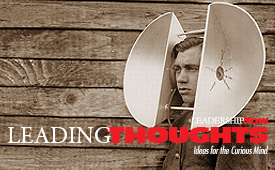 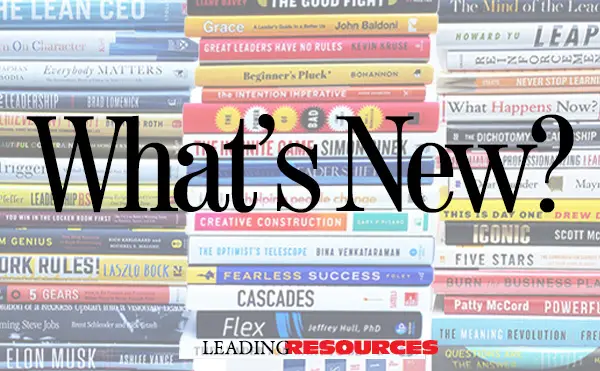
Posted by Michael McKinney at 11:36 AM
Permalink
| Comments (0)
| Leading Thoughts
12.28.21

Nailing It: How History's Awesome Twentysomethings Got It Together
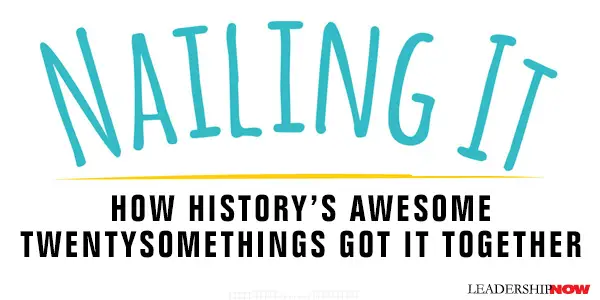
ROBERT DILENSCHNEIDER looks at the lives of twenty-five accomplished men and women and asks what they were doing at around age 25 that led them to become the people they became in Nailing It: How History’s Awesome Twentysomethings Got It Together. Specifically, he looks at the influences like education, parents, friends, and events in the world that helped them make the choices they made.
Businessman and former ambassador Donald Blinken explains the motivation behind this book in the foreword:
This book was born out of Bob Dilenschneider’s concern about how demoralizing it is for many young people to consider their futures. Young people that believe that their education may be useless and that their career opportunities have fallen apart before they have even started out. The book is written to demonstrate that many of history‘s most accomplished people were in similar situations when they were at about the same stage in life. Some, without knowing it, were already on the path to success. Some had fallen off that path and had to find it again. Some didn’t even know that for them there was a path. Yet, in the end, all of them found their way and made memorable contributions.
Success is rarely a straight line. There is no ideal path to follow. The key is to avoid distractions, accept criticism as information to guide you, and build resilience to inevitable setbacks.
Here’s a short excerpt provided by the publisher from the chapter about Roberto Marinho, who at an early age inherited the Brazilian newspaper his father had founded. Under enormous pressure, he showed the patience and determination to learn his craft and, as a result, rose to a position of national prominence.
For nearly seventy years, Roberto Marinho had dominated print journalism and the radio and television industries, building on the shaky foundation of inheriting—when he was barely into his twenties—the newspaper that his father had founded just weeks before he died. His media properties achieved immense clout in Brazil and beyond, rivaling the status of their American counterparts. His personal wealth, in 2000, was estimated at $6.4 billion.
To tell you the story of how Roberto Marinho came to be so influential and successful, I’ll start with his newspaperman father, Irineu Marinho. As the son of such a man myself, I can imagine the energy—and family support—it took to accomplish what Irineu did.
In rapid-fire succession, the salient facts of Irineu’s career are these: As a student at the age of 15 in 1891, Irineu founded a branch of a Portuguese royal literature society in his birthplace of Niteroi, Brazil, as well as two newspapers; he became a correspondent for a third newspaper the next year. In 1894, he moved to Rio de Janeiro and continued his career with the established publications Diario de Noticias, A Tribuna, and A Noticia. In 1903, he married; his first child, Roberto, was born on December 3, 1904 (five additional children would follow). In 1911, he cofounded A Noite, the first evening newspaper in Rio de Janeiro. In 1922, he was jailed for four months for helping instigate the revolta tenentista of that July. In 1924, he took his family to Europe in search of improved publishing techniques, more sophisticated equipment, and so forth. During his absence, a coup of sorts removed him from A Noite. In 1925, he founded O Globo—and died of a heart attack in August 1925, less than a month after the first issue of O Globo. He was 49, his son and heir Roberto not quite 21.
Roberto had accompanied his father to Europe. Trained as a joiner and a mechanic and no stranger to hands-on work, Roberto acted as Irineu’s secretary during the prospecting trip and then took a job as a cub reporter on the new newspaper.
What was the fledgling reporter to do now? He knew what was expected of him: to fill his father’s shoes. Did he want such unexpected journalistic and business responsibility at such a young age? And at a time of personal grief? Clearly, newspaper publishing, a strong work ethic, and entrepreneurship were in Roberto’s DNA, but was it enough? As devoted as he may have been to his father, did Roberto have different dreams for his own future that he put aside?
What a push-pull Roberto must have experienced! Many of us have been in a similar situation in our lives. To the young man’s credit, he seemed to embrace his destiny, something not everyone can do, or wants to do. Moreover, he was humble about it.
According to a retrospective on his life published in The Independent, Marinho “insisted on working his way up from the bottom, learning all aspects of the business.” He had been at his father’s side the entire time when O Globo was being founded. Now he would step forward and follow in his footsteps, but respectfully, earning his place. A journalist named Eurycles de Mattos was put in the position of editor-in-chief, with Roberto as his secretary. He took that position because of his inexperience, but he treated it as a learning opportunity. And then, in 1931, with the death of de Mattos, Roberto, now 26, took over the position of editor-in-chief.
After 1931, Roberto Marinho never slowed down. He quickly assured some financial security for O Globo by republishing U.S. comics in Portuguese and went on from there.
“A mix of pragmatism and stubbornness helped him build his empire,” wrote The New York Times in its obituary. The “Brazilian Media Mogul” methodically increased O Globo’s circulation, expanded into radio (1954) and television (1965), and, in the five years before his death, founded successful tabloids in Rio and São Paulo. To all that in the late 1960s he added a string of magazines and a publishing house.
But in the long run, it was the Globo television network, known as Rede Globo, that became Marinho’s most important enterprise. Rede Globo signed up 113 affiliated stations, extending its reach into every corner of Brazil—according to one analysis, it eventually covered 99.98 percent of the country— making Roberto one of the most influential men in the nation regardless of who the president was.
One key to TV Globo’s popularity was its telenovelas, well-crafted soap operas that were hits not only in Brazil, but all over the world, including in Britain and the United States. And the network’s populist news coverage gained enormous audiences because, Marinho said, it gave Brazilians “a new way of viewing the world.”
Dilenschneider also looks at the lives of Mozart, Mary Shelley, Grant, Einstein, Helen Keller, Elizabeth Kenny, Branch Rickey and Jackie Robinson, Coco Chanel, Golda Meir, Edith Piaf, Akio Morita, Audrey Hepburn, Christa McAuliffe, Steve Jobs, among others.
* * *  Follow us on Instagram and Twitter for additional leadership and personal development ideas.
* * *


 
Posted by Michael McKinney at 09:40 AM
Permalink
| Comments (0)
| Personal Development
12.23.21

Leading Thoughts for December 23, 2021

IDEAS shared have the power to expand perspectives, change thinking, and move lives. Here are two ideas for the curious mind to engage with:
I.
Michael Useem on what got you here won’t get you there or reinventing yourself as you move forward:
“The factors that led others to select you to manage a team, an office, or even an enterprise, are going to change as markets and methods evolve, pushing you to the edge, and making it vital to continually consider the additional leadership capacities required now. The best capacities of an earlier time thus remain informative but also incomplete for the challenges we face ahead.”
Source: The Edge: How Ten CEOs Learned to Lead--And the Lessons for Us All
II.
Alaa Garad and Jeff Gold on how disruption and crisis require strategic learning across the organization:
“Leaders must engage in learning that is continuous and strategic, that has to include a willingness to embrace critical thinking to avoid … functional stupidity whereby leaders can prevent learning and change for the sake of maintaining and sustaining an order that they avoid justifying. In a similar manner, some leaders can be accused of hubris, show contempt for criticism from others and become capable of inflicting damage on their organizations.”
Source: The Learning-Driven Business: How to Develop an Organizational Learning Ecosystem
* * *
Look for these ideas every Thursday on the Leading Blog. Find more ideas on the LeadingThoughts index.
* * *  Like us on Instagram and Facebook for additional leadership and personal development ideas.

 
Posted by Michael McKinney at 11:37 AM
Permalink
| Comments (0)
| Leading Thoughts
12.16.21

Leading Thoughts for December 16, 2021

IDEAS shared have the power to expand perspectives, change thinking, and move lives. Here are two ideas for the curious mind to engage with:
I.
Former PepsiCo CEO Indra Nooyi on leadership:
“The fundamental role of a leader is to look for ways to shape the decades ahead, not just react to the present, and to help others accept the discomfort of disruptions to the status quo.”
Source: My Life in Full: Work, Family, and Our Future
II.
Gaurav Bhatnagar and Mark Minukas on fear:
“Fear is neither good nor bad. It is merely an emotion you feel when you get an outcome that is different from what you expect. The story we create about fear matters more that the fear itself. We control those stories and can craft either a negative one of doom and gloom or see fear as a cue for growth. When we are able to do the latter, fear becomes a path that leads to a better future.”
Source: Unfear: Transform Your Organization to Create Breakthrough Performance and Employee Well-Being
* * *
Look for these ideas every Thursday on the Leading Blog. Find more ideas on the LeadingThoughts index.
* * *  Like us on Instagram and Facebook for additional leadership and personal development ideas.

 
Posted by Michael McKinney at 12:34 PM
Permalink
| Comments (0)
| Leading Thoughts
12.15.21

The Best Leadership Books of 2021

The political environment in the United States as elsewhere is driven by fear-based narratives. And that feeds our approach in society at large. It leads to short-term thinking. That’s not the way to lead. Leadership is about hope.
Former PepsiCo CEO Indra Nooyi wrote, “the fundamental role of a leader is to look for ways to shape the decades ahead, not just react to the present, and to help others accept the discomfort of disruptions to the status quo.”
Leaders are dealers in hope. Many of the books listed below help us to do just that. Others were included because they help us to think differently, opening us up to potential we might not have considered. The books listed below help us to build the right foundation from which we can lead others. When we get it right on the inside, we can do right on the outside.
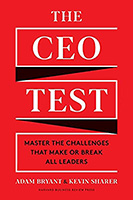 The CEO Test: Master the Challenges That Make or Break All Leaders The CEO Test: Master the Challenges That Make or Break All Leaders
by Adam Bryant and Kevin Sharer
(Harvard Business Review Press, 2021)
Despite all the effort through the years to understand what it takes to be an effective leader, the challenges of leadership remain enormously difficult and elusive; even today, most CEOs don't last five years in the job. The demands to deliver at a consistently high level can be unforgiving. These challenges are brought into their highest and sharpest relief in the corner office, but they are hardly unique to chief executives. All leaders face their own version of these tests, and the authors draw on the distilled wisdom, stories, and lessons from hundreds of chief executives to show how every aspiring leader can master these challenges and lead like a CEO. These foundational leadership skills will make all aspiring executives more effective in their roles today and lift the trajectory of their careers. (Blog Post)


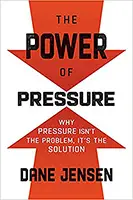 The Power of Pressure: Why Pressure Isn't the Problem, It's the Solution The Power of Pressure: Why Pressure Isn't the Problem, It's the Solution
by Dane Jensen
(Collins, 2021)
What’s the most pressure you’ve ever been under? How did you react? What helped? What didn’t? Over the past five years, Dane Jensen has asked these questions of thousands of high performers—from Olympic gold medalists to Navy SEALs, politicians, executives and busy parents. What has emerged from these conversations is that while everyone’s experiences under pressure are unique, pressure follows patterns and develops in predictable ways. If we can recognize the patterns, we can improve our ability to sidestep the biological traps that can sabotage us—and use the energy that accompanies pressure to thrive. (Blog Post)


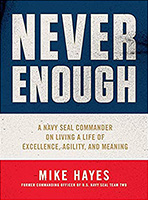 Never Enough: A Navy SEAL Commander on Living a Life of Excellence, Agility, and Meaning Never Enough: A Navy SEAL Commander on Living a Life of Excellence, Agility, and Meaning
by Mike Hayes
(Celadon Books, 2021)
Mike Hayes has lived a lifetime of once-in-a-lifetime experiences. He has been held at gunpoint and threatened with execution. He’s jumped out of a building rigged to explode, helped amputate a teammate’s leg, and made countless split-second life-and-death decisions. He’s written countless emails to his family, telling them how much he loves them, just in case those were the last words of his they’d ever read. Outside of the SEALs, he’s run meetings in the White House Situation Room, negotiated international arms treaties, and developed high-impact corporate strategies. In Never Enough, Mike Hayes recounts dramatic stories and offers battle- and boardroom-tested advice that will motivate readers to do work of value, live lives of purpose, and stretch themselves to reach their highest potential. (Blog Post)


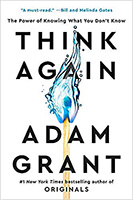 Think Again: The Power of Knowing What You Don't Know Think Again: The Power of Knowing What You Don't Know
by Adam Grant
(Viking, 2021)
Intelligence is usually seen as the ability to think and learn, but in a rapidly changing world, there's another set of cognitive skills that might matter more: the ability to rethink and unlearn. In our daily lives, too many of us favor the comfort of conviction over the discomfort of doubt. We listen to opinions that make us feel good, instead of ideas that make us think hard. We see disagreement as a threat to our egos, rather than an opportunity to learn. We surround ourselves with people who agree with our conclusions, when we should be gravitating toward those who challenge our thought process. The result is that our beliefs get brittle long before our bones. We think too much like preachers defending our sacred beliefs, prosecutors proving the other side wrong, and politicians campaigning for approval--and too little like scientists searching for truth. Intelligence is no cure, and it can even be a curse: being good at thinking can make us worse at rethinking. The brighter we are, the blinder to our own limitations we can become. (Blog Post)


 Be Where Your Feet Are: Seven Principles to Keep You Present, Grounded, and Thriving Be Where Your Feet Are: Seven Principles to Keep You Present, Grounded, and Thriving
by Scott O'Neil
(St. Martin's Essentials, 2021)
When we're moving at 115 MPH, we rarely see the wall coming. But it comes for all of us and when it does, we grasp for lessons, for meaning, for purpose. Each moment (good or bad) and each win or loss, provides us an opportunity to learn, and if we choose to take it, that opportunity can change our lives-and the world- for the better. The human spirit craves connection. Authenticity. Belonging. Touch. Gratitude. Purpose. We need to make our interactions count. Whether it's the death of a friend, loss of a job, a bad break-up or the isolation of Covid-19, those who manage to be where their feet are will grow, stretch and emerge stronger, smarter and more prepared as we find peace and gratitude in the pause. (Blog Post)


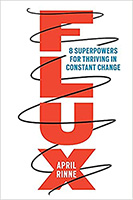 Flux: 8 Superpowers for Thriving in Constant Change Flux: 8 Superpowers for Thriving in Constant Change
by April Rinne
(Berrett-Koehler Publishers, 2021)
A world in flux calls for a new mindset, one that treats constant change and uncertainty as a feature, not a bug. Flux helps readers open this mindset—a flux mindset—and develop eight “flux superpowers” that flip conventional ideas about leadership, success, and well-being on their heads. They empower people to see change in new ways, craft new responses, and ultimately reshape their relationship to change from the inside out.


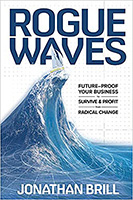 Rogue Waves: Future-Proof Your Business to Survive and Profit from Radical Change Rogue Waves: Future-Proof Your Business to Survive and Profit from Radical Change
by Jonathan Brill
(McGraw-Hill Education, 2021)
At this moment, rogue waves are forming under your business. Emerging technologies, changing demographics, the data economy, automation, and other trends-the undercurrents of radical, systemic change-are crashing into each other. When they converge, they’ll produce sea changes that sink companies and wash away entire industries overnight. If your competitor can’t ride out the next wave and you can, you win. In Rogue Waves, Jonathan Brill-a renowned expert on resilient growth and decision making under uncertainty-shows you how to prepare your business to survive and thrive through the most radical upheavals.


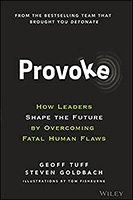 Provoke: How Leaders Shape the Future by Overcoming Fatal Human Flaws Provoke: How Leaders Shape the Future by Overcoming Fatal Human Flaws
by Geoff Tuff and Steven Goldbach, Illustrated by Tom Fishburne
(Wiley, 2021)
In Provoke, renowned strategy consultants and best-selling authors Geoff Tuff and Steven Goldbach deliver an insightful exploration of how people tend to act tentatively in the face of uncertainty and provide the tools we need to do things differently. Tuff and Goldbach offer up a compelling argument for the proposition that taking a "wait and see" approach is the exact opposite of what helps visionary leaders change the world. Drawing on principles from business and behavioral economics, the book shows readers from all walks of life how to provoke action as a mechanism to advance.


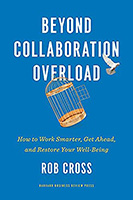 Beyond Collaboration Overload: How to Work Smarter, Get Ahead, and Restore Your Well-Being Beyond Collaboration Overload: How to Work Smarter, Get Ahead, and Restore Your Well-Being
by Rob Cross
(Harvard Business Review Press, 2021)
The dilemma is that we all need to collaborate more to create effective organizations and vibrant careers for ourselves. But conventional wisdom on teamwork and collaboration has created too much of the wrong kind of collaboration, which hurts our performance, health and overall well-being. In Beyond Collaboration Overload, Babson professor Rob Cross solves this paradox by showing how top performers who thrive at work collaborate in a more purposeful way that makes them 18-24% more efficient than their peers. Good collaborators are distinguished by the efficiency and intentionality of their collaboration—not the size of their network or the length of their workday.


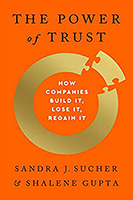 The Power of Trust: How Companies Build It, Lose It, Regain It The Power of Trust: How Companies Build It, Lose It, Regain It
by Sandra J. Sucher and Shalene Gupta
(PublicAffairs 2021)
Trust is the most powerful force underlying the success of every business. Yet it can be shattered in an instant, with a devastating impact on a company’s market cap and reputation. How to build and sustain trust requires fresh insight into why customers, employees, community members, and investors decide whether an organization can be trusted. Based on two decades of research and illustrated through vivid storytelling, Sandra J. Sucher and Shalene Gupta examine the economic impact of trust and the science behind it, and conclusively prove that trust is built from the inside out.


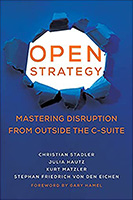 Open Strategy: Mastering Disruption from Outside the C-Suite Open Strategy: Mastering Disruption from Outside the C-Suite
by Christian Stadler, Julia Hautz, Kurt Matzler, and Stephan Friedrich von den Eichen
(The MIT Press 2021)
Why are some of the world’s most successful companies able to stay ahead of disruption, adopting and implementing innovative strategies, while others struggle? It’s not because they hire a new CEO or expensive consultants but rather because these pioneering companies have adopted a new way of strategizing. Instead of keeping strategic deliberations within the C-Suite, they open up strategic initiatives to a diverse group of stakeholders—front-line employees, experts, suppliers, customers, entrepreneurs, and even competitors. Open Strategy presents a new philosophy, key tools, step-by-step advice, and fascinating case studies—from companies that range from Barclays to Adidas—to guide business leaders in this groundbreaking approach to strategy.


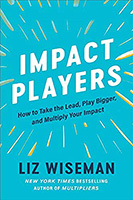 Impact Players: How to Take the Lead, Play Bigger, and Multiply Your Impact Impact Players: How to Take the Lead, Play Bigger, and Multiply Your Impact
by Liz Wiseman
(Harper Business 2021)
In every organization there are Impact Players—those indispensable colleagues who can be counted on in critical situations and who consistently receive high-profile assignments and new opportunities. Whether they are on center stage or behind the scenes, managers know who these top players are, understand their worth, and want more of them on their team. While their impact is obvious, it’s not always clear what actually makes these professionals different from their peers. Wiseman explains what the most influential players are doing differently, how small and seemingly insignificant differences in how we think and act can make an enormous impact, and why—with a little coaching—this mindset is available to everyone who wants to contribute at their highest level.


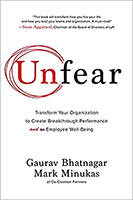 Unfear: Transform Your Organization to Create Breakthrough Performance and Employee Well-Being Unfear: Transform Your Organization to Create Breakthrough Performance and Employee Well-Being
by Gaurav Bhatnagar and Mark Minukas
(McGraw-Hill Education, 2021)
Fear and uncertainty have been undermining performance and well-being in the workplace for as long as we have had workplaces. Here’s a little-known fact of business: mismanaged fear is responsible for almost all of the dysfunction that most organizations experience. While fear can drive short-term results, it does so at the cost of high employee burnout and turnover. It also undermines long-term business performance. But we can’t eradicate it entirely; it is inherent to the human condition. Winning organizations aren’t fear-free; they know how to reframe fear into opportunities for learning and growth. They create resilient cultures of unfear.


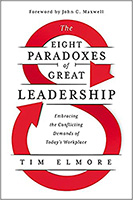 The Eight Paradoxes of Great Leadership: Embracing the Conflicting Demands of Today's Workplace The Eight Paradoxes of Great Leadership: Embracing the Conflicting Demands of Today's Workplace
by Tim Elmore
(HarperCollins Leadership, 2021)
Tim Elmore helps leaders of all kinds navigate increasingly complex, rapidly changing environments, as well as manage teams who bring a range of new demands and expectations to the workplace that haven’t been seen even one generation prior. Tim offers counter-intuitive paradoxes that, when practiced, enable today’s leader to differentiate themselves and better connect with their team and customers. The book furnishes ideas that equip leaders to inspire team members in a way a paycheck never could. Having trained hundreds of thousands of young professionals to develop into leaders—Dr. Elmore shares the secrets of next generation leaders who have practiced the unique paradoxes outlined in this book and inspired their team members in a way that a paycheck never could.

Emerging Theme:
 Considering the current state of our private and public discourse, it is not surprising that the quality of grace has surfaced. Grace is a way of looking at life but is only made virtuous when we act on it.
Considering the current state of our private and public discourse, it is not surprising that the quality of grace has surfaced. Grace is a way of looking at life but is only made virtuous when we act on it.
John Baldoni wrote a book about it in 2019 (Blog Post), and he offered this year a series of reflections on finding moments of grace in 2020. (Blog Post). At the end of the year, Korn Ferry CEO Gary Burnison releases The Five Graces of Life and Leadership. Burnison breaks down the grace perspective into five elements: gratitude, resilience, aspiration, courage, and empathy. Grace is easy to demonstrate with friends and loved ones, but it is hard, but all the more necessary, when the person before us is not on the same page or puts us in a difficult position.
Biographies:

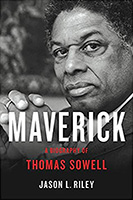 Maverick: A Biography of Thomas Sowell Maverick: A Biography of Thomas Sowell
by Jason L Riley
(Basic Books, 2021)
Thomas Sowell is one of the great social theorists of our age. In a career spanning more than a half century, he has written over thirty books, covering topics from economic history and social inequality to political theory, race, and culture. His bold and unsentimental assaults on liberal orthodoxy have endeared him to many readers but have also enraged fellow intellectuals, the civil-rights establishment, and much of the mainstream media. The result has been a lack of acknowledgment of his scholarship among critics who prioritize political correctness.


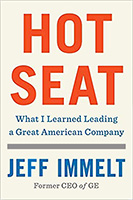 Hot Seat: What I Learned Leading a Great American Company Hot Seat: What I Learned Leading a Great American Company
by Jeff Immelt with Amy Wallace
(Avid Reader Press / Simon & Schuster, 2021)
In Hot Seat, Immelt offers a rigorous and raw interrogation of himself and his tenure, detailing for the first time his proudest moments and his biggest mistakes. The most crucial component of leadership, he writes, is the willingness to make decisions. But knowing what to do is a thousand times easier than knowing when to do it. Perseverance, combined with clear communication, can ensure progress, if not perfection, he says. That won’t protect any CEO from second-guessing, but Immelt explains how he’s pushed through even the most withering criticism: by staying focused on his team and the goals they tried to achieve. Jeff Immelt and his co-author Amy Wallace have written a very readable, inside look at Immelt’s 16 years as CEO of GE. There are many lessons and takeaways to be found inside. (Blog Post)


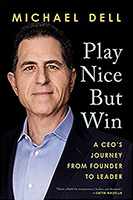 Play Nice But Win: A CEO's Journey from Founder to Leader Play Nice But Win: A CEO's Journey from Founder to Leader
by Michael Dell with James Kaplan
(Portfolio, 2021)
In 1984, soon-to-be college dropout Michael Dell hid signs of his fledgling PC business in the bathroom of his University of Texas dorm room. Almost 30 years later, at the pinnacle of his success as founder and leader of Dell Technologies, he found himself embroiled in a battle for his company’s survival. What he’d do next could ensure its legacy—or destroy it completely. Play Nice But Win is a riveting account of the three battles waged for Dell Technologies: one to launch it, one to keep it, and one to transform it.


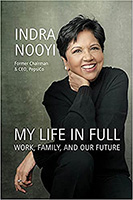 My Life in Full: Work, Family, and Our Future My Life in Full: Work, Family, and Our Future
by Indra Nooyi
(Portfolio, 2021)
For a dozen years as one of the world’s most admired CEOs, Indra Nooyi redefined what it means to be an exceptional leader. The first woman of color and immigrant to run a Fortune 50 company — and one of the foremost strategic thinkers of our time — she transformed PepsiCo with a unique vision, a vigorous pursuit of excellence, and a deep sense of purpose. Now, in a rich memoir brimming with grace, grit, and good humor, My Life in Full offers a firsthand view of Nooyi’s legendary career and the sacrifices it so often demanded.


 Made From Scratch: The Legendary Success Story of Texas Roadhouse Made From Scratch: The Legendary Success Story of Texas Roadhouse
by Kent Taylor
(Simon & Schuster, 2021)
In Made From Scratch, the late business maverick Kent Taylor tells the legendary story of Texas Roadhouse and in the process reveals its recipe for success: embracing unorthodox business practices. Because isn’t it a little unusual for a company to do almost no advertising? Is it wild to give away free peanuts and rolls and keep prices low, even as costs rise, or to keep the menu basically the same since it opened? Does it fly in the face of reason to prohibit coats and ties at headquarters and to have a CEO who dressed like he was part of the landscaping crew? (Blog Post)


* * *  Follow us on Instagram and Twitter for additional leadership and personal development ideas.

 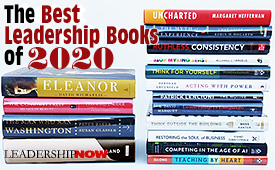
Posted by Michael McKinney at 12:30 PM
Permalink
| Comments (0)
| Books
12.09.21

Leading Thoughts for December 9, 2021

IDEAS shared have the power to expand perspectives, change thinking, and move lives. Here are two ideas for the curious mind to engage with:
I.
Michael Dell on success:
“Success is not a straight line up. It’s fail, learn, try again, then (you hope) succeed. How successful you are is really a function of how well you deal with failure—and how much you learn from it. Many people don’t reach their greatest potential because they fear failure. In avoiding failure, they deprive themselves of a great teacher. Many others fall short because of a lack of opportunity, capital, knowledge, or skills. Persistence is an all-important quality on the road to success. (And success presents its own challenges, avoiding complacency being the first and biggest. Which is why, along with kaizen, PBNS—pleased but never satisfied—has been part of our culture since the beginning.)”
Source: Play Nice But Win: A CEO’s Journey from Founder to Leader
II.
Gary Vaynerchuk on the value of soft skills to build a successful company:
“Modern society’s definition of a ‘smart business decision’ is disproportionately predicated on analytics. Business leaders tend to find safety in the ‘black-and-white.’ They find safety in the academics, math, hard data, and what looks good on spreadsheets.
“It’s harder to gauge the 30-, 60-, -90, -365, or even 730-day effectiveness of empathy, kindness, and self-awareness in an organization, but their results will play out. When you can eliminate fear from your organization, very good things happen.
“Unfortunately, the bias toward short-term metrics can also make emotional intelligence a ‘nice to have rather than a requirement.
”
Source: Twelve and a Half: Leveraging the Emotional Ingredients Necessary for Business Success
* * *
Look for these ideas every Thursday on the Leading Blog. Find more ideas on the LeadingThoughts index.
* * *  Like us on Instagram and Facebook for additional leadership and personal development ideas.

 
Posted by Michael McKinney at 10:10 AM
Permalink
| Comments (0)
| Leading Thoughts
12.07.21

Speak Your Truth So That Others Can Hear It
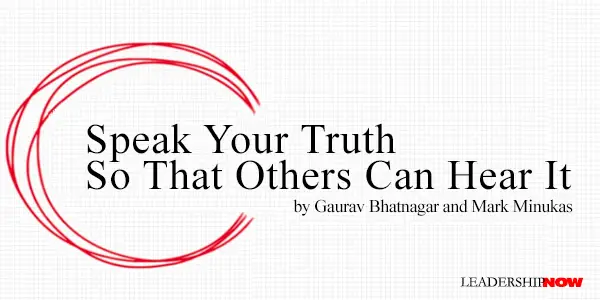
WE often live in the dilemma of sharing what’s on our mind directly and truthfully or mollifying and suppressing what we really think. This, however, is a false dichotomy. We don’t just have to share our truth in a toxic way or suppress it. The other choice is to learn to speak our truth effectively, in a way that doesn’t contribute to fear and dysfunction on a team. There are two maxims for speaking your truth effectively: own your perspective and be respectful:
Own Your Perspective. The first part of speaking effectively in difficult conversations is learning to speak from a place of ownership. This might seem like a simple thing—just say what you mean!—but it goes much deeper than that. When we are truly taking ownership, we speak from a position of knowledge about what’s in our own minds and are clear about what we don’t fully know. And ultimately, there’s only one thing that we can speak directly about: our own perspective. Owning our perspective means that we acknowledge that our points of view and our interpretations are inherently limited. We don’t hold our views as absolute truth because they aren’t.
To understand what we mean, we have to talk about the difference between observation and interpretation. An observation is a statement of fact, verifiable by others. Our interpretation is the meaning that we give that fact. A truly clear-minded and epistemically humble person recognizes that his or her interpretations aren’t inherently true or complete and acknowledges this in conversation. These people also recognize that they will always have more to learn about a situation. People who are misguided or fooling themselves will state their interpretation as fact and cling to it.
Said differently, we tend to live as if the fictions unfolding inside our minds are really facts that are evident for everyone else to see. Clear thinking is not rejecting these fictions but seeing them for what they are—our perspective, not the perspective.
To have effective difficult conversations, therefore, we must learn to separate observation from interpretation. This is harder than it sounds. Let’s have a little quiz. Which of these statements are interpretations and which are observations?
- “That meeting went way too long.”
- “You made a great point.”
- “You’re late, again.”
- “We had a very positive quarter with 10 percent growth in sales.”
- “You didn’t let me finish my point.”
- “The meeting started at five minutes past the hour.”
The last statement is the only observation. Every one of the other statements is an interpretation because they all have assumptions built into them. What does too long mean? What’s a great point? Who’s to say that the 10 percent growth in sales is very positive?
To open a conversation with any of these statements without acknowledging that they are interpretations could lead to trouble. Communicators who take ownership of their perspective use versions of this phrase: “I observed [blank]. From that I interpreted [blank]. Is that accurate?” For example, instead of saying, “That meeting went way too long,” you can say “The meeting ended 20 minutes past schedule. When this happens, I interpret this as meaning that our team isn’t working very efficiently. How do others see it?”
It might feel silly to use this language for something that seems relatively small. But it is vital to build this habit of communication so that in more pressing and stressful situations you don’t revert to a more toxic, interpretation-as-fact style in the midst of an amygdala hijack. Using this language is a powerful way to deliver a message to others without making them wrong. You’re not offering your interpretation as a statement of objective truth; you’re offering your interpretation. Given a dialogue and new information, you could very well change how you see things.
Your interpretation isn’t the end of the conversation—it’s simply the starting point. Own it but hold it lightly. Stay curious, and update your interpretation as you learn more.
Be Respectful. When speaking, we all have a responsibility to package our thoughts in words that can be received easily. If someone asks you what you think about a project and you say, “My interpretation is that it sucks,” you may be honest, but you’re not being respectful. This response would likely trigger an amygdala hijack in the other person, make that person defensive, and completely ruin any chance of productive communication.
To be respectful, we need to share the values and concerns that have led us to the interpretation that we’ve made. In other words, we have to speak to the feelings and identity levels of the conversation. So, instead of saying that the project sucks, share what values are at stake and what concerns you have. You may value the opportunity to provide input on the project and share your thoughts openly, even if they’re not popular opinions. You may value the team and company putting time and resources into successful projects, but don’t want to see the company waste money on failing ones. In terms of concerns, you may be concerned that the team is throwing good money after bad. Or perhaps the team hasn’t applied the lessons learned from the last project that didn’t go so well.
What’s important to keep in mind is that these are your values and your concerns, and they’ve led to your own interpretation. You own them. You’re not projecting a toxic interpretation of events onto other people. You’re simply expressing what’s important to you. And your interpretation is so important that you want to share it, without judgment and blame, with others.
Now, when your boss asks for your opinion, you can tap into your values and concerns and share them: “Thank you for giving me the opportunity to share my views. Making sure this project is successful is important to me, and I think it’s critical that the company makes good use of limited resources. I’m concerned that this project is not on the right track, and we haven’t been able to make use of the lessons learned from the last project on this one.” This statement is honest and respectful. You say what you mean, you don’t make anybody wrong for what has happened, and you create the space for a learning dialogue.
This is what difficult conversations are all about: learning to say what you mean while giving people room to say what they mean. It’s like a jazz musi-cian who learns how to play his own instrument and then makes sure to leave room for the rest of the ensemble to contribute their notes. Let the music begin.
(Excerpt from Unfear: Transform Your Organization to Create Breakthrough Performance and Employee Well-Being by Gaurav Bhatnagar and Mark Minukas, McGraw Hill, November 2021)
* * *Gaurav Bhatnagar and Mark Minukas are coauthors of Unfear: Transform Your Organization to Create Breakthrough Performance and Employee Well-Being. Gaurav Bhatnagar is the founder of Co-Creation Partners and has dedicated more than two decades to helping companies thrive and achieve breakthrough performance. Since founding Co-Creation Partners in 2010, he has designed and led programs and workshops for private, public, and social-sector clients across multiple industries, including financial services, basic materials, manufacturing, healthcare, and technology. Prior to founding Co-Creation Partners, he was a consultant with McKinsey and Company, most recently as a leader in their Organization Practice in North America. Before McKinsey, he worked in marketing for Pepsi Cola International and Procter & Gamble in Europe, the Middle East, and India. Mark Minukas is the managing partner of Co-Creation Partners. An engineer by training, he began his career as a Navy officer and member of the US Naval Construction Battalion (Sea-bees) and the Navy Dive Community. In 2005, he brought his experience and insights into the performance of engineered systems to McKinsey and Company, where he worked as a consultant and member of the Operations Practice. There, he mastered the technical aspect of organizational transformation and process improvement, as well as the cultural side of transformation. Since leaving McKinsey to join Co-Creation Partners, Mark has worked across multiple industries, including financial services, high tech, biotech manufacturing, IT services, and governmental offices, to deliver both top- and bottom-line improvements and build high-performing operations.
* * *  Follow us on Instagram and Twitter for additional leadership and personal development ideas.
* * *


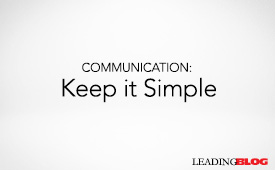 
Posted by Michael McKinney at 11:09 AM
Permalink
| Comments (0)
| Communication
12.02.21

Leading Thoughts for December 2, 2021

IDEAS shared have the power to expand perspectives, change thinking, and move lives. Here are two ideas for the curious mind to engage with:
I.
Amelia Dunlop on elevating the human experience:
“Elevating the human experience is about acknowledging intrinsic worth as a human and nurturing growth through love. Sometimes the person we need to see most worthy of love is ourselves. Sometimes it is another person. Sometimes it is a group of people who have been unseen.”
Source: Elevating the Human Experience: Three Paths to Love and Worth at Work
II.
John Parker Stewart and Daniel J. Stewart on understanding effective leadership is something you learn as you go along:
“One of our wonderful colleagues, John Zorbini, often said that if leadership were a car, you would think it must be a classic red Ferrari with the way we traditionally talk about it—or even the way we all think to ourselves about it. We sometimes put the idea of leadership on a pedestal and speak about it reverently. It’s the idea that when you become a leader, you are blessed with instant knowledge, judgment, and prestige.
“But, Zorbini pointed out, if leadership really were a car, it would be a beat-up old truck. It would have dents and dings. Maybe the side panels would be different colors and the interior worn out, but it would have four wheels, move, and get the job done. It’s functional, but not glamourous, and the messiness of learning to lead is visible.”
Source: LEAD NOW!: A Personal Leadership Coaching Guide for Results-Driven Leaders
* * *
Look for these ideas every Thursday on the Leading Blog. Find more ideas on the LeadingThoughts index.
* * *  Like us on Instagram and Facebook for additional leadership and personal development ideas.

 
Posted by Michael McKinney at 06:05 PM
Permalink
| Comments (0)
| Leading Thoughts
12.01.21

First Look: Leadership Books for December 2021
Here's a look at some of the best leadership books to be released in December 2021. Don't miss out on other great new and future releases not listed here.
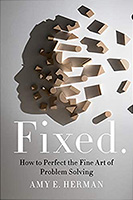 Fixed. How to Perfect the Fine Art of Problem Solving by Amy E Herman Fixed. How to Perfect the Fine Art of Problem Solving by Amy E Herman
With Amy Herman’s Fixed., we now have access to what the FBI, NATO, the State Department, Interpol, Scotland Yard, and many more organizations and their leaders have been using to solve their most intractable problems. Demonstrating a powerful paradigm shift for finding solutions, Herman teaches us to see things differently, using art to challenge our default thinking and open up possibilities otherwise overlooked. Her unexpected, insightful, and often delightful methodology is sought after by leaders and professionals for whom failure is catastrophic. Luckily for us, these tactics work— no matter the problem’s scale or complexity.

 The Five Graces of Life and Leadership by Gary Burnison The Five Graces of Life and Leadership by Gary Burnison
Five simple qualities that captures the essence of outstanding leadership today. In today’s world, leadership is all about establishing community and connectivity so everyone can be part of something bigger than themselves. To have the grace to create this kind of leadership, we need greater self-awareness and genuine connection to others. In The Five Graces of Life and Leadership, CEO of the celebrated consulting firm Korn Ferry delivers a meaningful and thought-provoking exploration of leadership, emphasizing the five kinds of grace that leaders absolutely must have to lead their teams in today’s evolving workscape. In the book, you’ll learn how to the best leaders make their teams feel comforted, safe, and secure that they’re headed in the right direction.

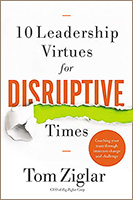 10 Leadership Virtues for Disruptive Times: Coaching Your Team Through Immense Change and Challenge by Tom Ziglar 10 Leadership Virtues for Disruptive Times: Coaching Your Team Through Immense Change and Challenge by Tom Ziglar
Tom Ziglar shares ten leadership virtues that are essential for coaching employees through immense change and creating an environment of maximum potential and productivity. Delivering cutting-edge new research, wisdom gleaned from experience, and poignant insights from his work at Zig Ziglar Corp, Tom Ziglar identifies the communication styles that will keep everyone on the same page, regardless of their working environment. He also emphasizes the importance of closing the "empathy gap" between management and staff in order to create a more connected team that operates to its fullest potential--and how developing each team member's unique dreams, goals, and abilities sets up the company for success.

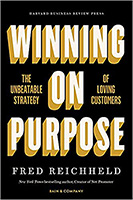 Winning on Purpose: The Unbeatable Strategy of Loving Customers byFred Reichheld with Darci Darnell and Maureen Burns Winning on Purpose: The Unbeatable Strategy of Loving Customers byFred Reichheld with Darci Darnell and Maureen Burns
Great leaders embrace a higher purpose to win. The Net Promoter System shines as their guiding star. Few management ideas have spread so far and wide as the Net Promoter System (NPS). Since its conception almost two decades ago by customer loyalty guru Fred Reichheld, thousands of companies around the world have adopted it—from industrial titans such as Mercedes-Benz and Cummins to tech giants like Apple and Amazon to digital innovators such as Warby Parker and Peloton. Now, Reichheld has raised the bar yet again. In Winning on Purpose, he demonstrates that the primary purpose of a business should be to enrich the lives of its customers. Why? Because when customers feel this love, they come back for more and bring their friends—generating good profits. This is NPS 3.0 and it puts a new take on the age-old Golden Rule—treat customers the way you would want a loved one treated—at the heart of enduring business success.

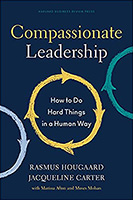 Compassionate Leadership: How to Do Hard Things in a Human Way by Rasmus Hougaard and Jacqueline Carter with Moses Mohan and Marissa Afton Compassionate Leadership: How to Do Hard Things in a Human Way by Rasmus Hougaard and Jacqueline Carter with Moses Mohan and Marissa Afton
A global pandemic, economic volatility, natural disasters, civil and political unrest. From New York to Barcelona to Hong Kong, it can feel as if the world as we know it is coming apart. Through it all, our human spirit is being tested. Now more than ever, it's imperative for leaders to demonstrate compassion. But in hard times like these, leaders need to make hard decisions—deliver negative feedback, make difficult choices that disappoint people, and in some cases lay people off. How do you do the hard things that come with the responsibility of leadership while remaining a good human being and bringing out the best in others? Most people think we have to make a binary choice between being a good human being and being a tough, effective leader. But this is a false dichotomy. Being human and doing what needs to be done are not mutually exclusive. In truth, doing hard things and making difficult decisions is often the most compassionate thing to do.

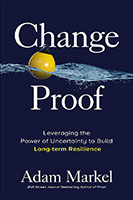 Change Proof: Leveraging the Power of Uncertainty to Build Long-term Resilience by Adam Markel Change Proof: Leveraging the Power of Uncertainty to Build Long-term Resilience by Adam Markel
When we think of resilience, we think of being able to “roll with the punches” and “bounce back” after uncertainty or change. But resiliency expert and bestselling author Adam Markel encourages you to aim higher. In Change Proof, he shows you how to truly, actually embrace change―to find the creative opportunity in uncertainty, as opposed to simply riding it out or reacting to it. In Change Proof, Markel demonstrates that this kind of resilience―thriving versus surviving―is a skill you can cultivate, both personally and professionally. Using case studies, current research, and real-life anecdotes from his work as an executive mentor, Markel clearly lays out the fundamentals of the required mind shift―how to change your relationship with change.

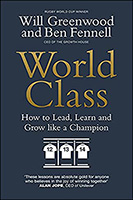 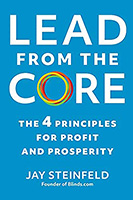 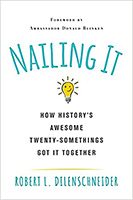

For bulk orders call 1-626-441-2024

Build your leadership library with these specials on over 28 titles. All titles are at least 40% off the list price and are available only in limited quantities.
* * *“He that loves a book will never want a faithful friend, a wholesome counselor, a cheerful companion, an effectual comforter. By study, by reading, by thinking, one may innocently divert and pleasantly entertain himself, as in all weathers, as in all fortunes.” — Isaac Barrow
* * *  Follow us on Instagram and Twitter for additional leadership and personal development ideas.

 
Posted by Michael McKinney at 10:21 AM
Permalink
| Comments (0)
| Books
|
 |
BUILD YOUR KNOWLEDGE
ADVERTISE WITH US





How to Do Your Start-Up Right
STRAIGHT TALK FOR START-UPS



Grow Your Leadership Skills
NEW AND UPCOMING LEADERSHIP BOOKS

Leadership Minute
BITE-SIZE CONCEPTS YOU CAN CHEW ON

Classic Leadership Books
BOOKS TO READ BEFORE YOU LEAD
|
 |
|
































